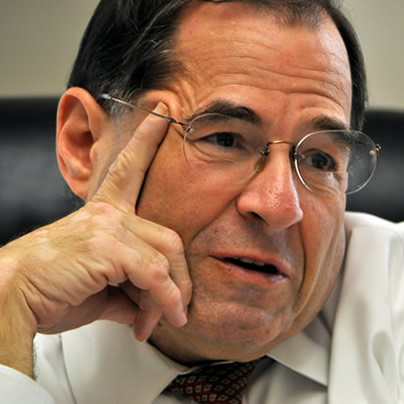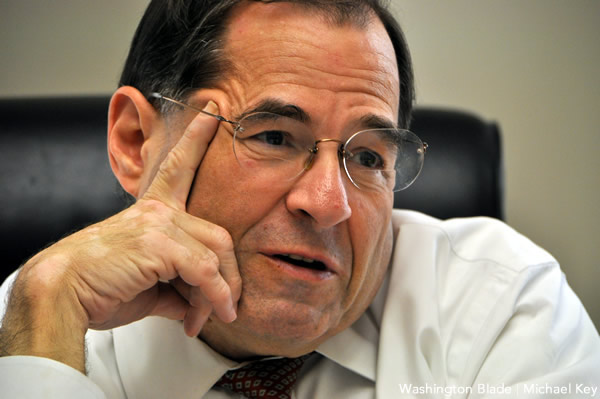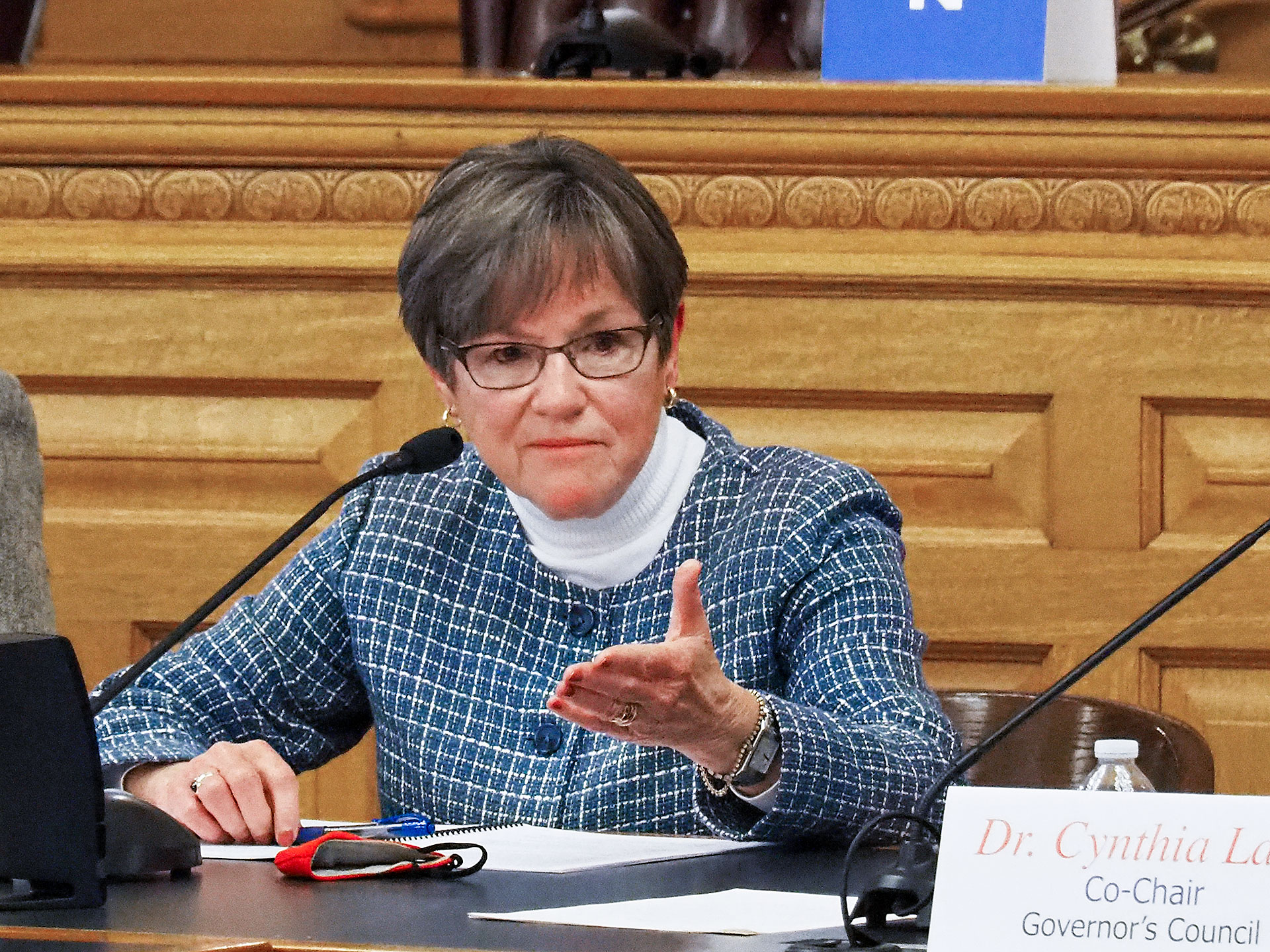National
Advocates eye immigration, ‘tax’ parity in next Congress
Plans surface for incorporating LGBT language in non-LGBT bills


Rep. Jerrold Nadler (D-N.Y.), one of the strongest allies of the LGBT community in Congress, is optimistic about possible advances for LGBT equality in Congress next year. (Washington Blade file photo by Michael Key)
With free-standing LGBT supportive bills having little or no chance of passing in Congress next year due to the Republican-controlled House, advocates are developing plans to push for inserting LGBT-supportive language in broader, non-gay bills that enjoy bipartisan support, according to Capitol Hill insiders.
One bill under consideration for inclusion in a broader, non-LGBT measure is the Uniting American Families Act, which would provide equal immigration rights to foreign nationals who are same-sex partners of American citizens.
Another bill under similar consideration is the Tax Parity for Health Plan Beneficiaries Act, which would allow domestic partners to obtain the same tax exemption for health insurance and other health benefits provided by employers that married opposite-sex couples now enjoy.
“There are lots of ways you can do this,” said Allison Herwitt, legislative director of the Human Rights Campaign, which is mapping strategy for LGBT-supportive legislation in the 113th Congress, which convenes in January.
“You can do it in committee. You could try to get it put in the bill as the bill is being written,” Herwitt said. “It’s always better to have the pro-equality language that we want put in the bill before it gets to the floor because it’s easier to protect your language from being stripped than it is to affirmatively add language.”
Herwitt and representatives with other LGBT advocacy groups say that despite the positive developments for the LGBT community in the Nov. 6 election, the makeup of Congress has remained largely the same in terms of the support for at least seven LGBT related bills.
Among them is the Employment Non-Discrimination Act, or ENDA, which calls for banning employment discrimination based on sexual orientation and gender identity, and the Respect for Marriage Act, which would repeal the anti-gay Defense of Marriage Act, or DOMA. DOMA defines marriage under federal law as a union only between a man and a woman.
Steve Ralls, a spokesperson for the national LGBT group Immigration Equality, said the group is “highly optimistic” that the Uniting American Families Act will pass in the first half of next year as part of a broader immigration reform bill.
Ralls notes that President Obama, most Democratic lawmakers, and some congressional Republicans support an immigration reform measure. With the Hispanic vote going overwhelmingly to Obama and Democratic congressional candidates in the election two weeks ago, Republican leaders are much more likely to go along with a comprehensive immigration bill that’s strongly supported by the U.S. Latino community, Ralls said.
He said Immigration Equality is confident that the Senate, under the leadership of Sen. Patrick Leahy (D-Vt.), who chairs the Senate Judiciary Committee, will support the inclusion of language from the Uniting American Families Act in an immigration reform bill.
“I am very hopeful that by next summer we could have a very significant win on this,” Ralls said.
Herwitt said she is similarly hopeful that the House and Senate will go along with including the tax parity measure for employer health benefits aimed at same-sex partners within a tax-related bill expected to come up next year.
R. Clarke Cooper, president of the Log Cabin Republicans, has said an LGBT-related bill most likely to gain Republican support in Congress is one that would redress unfair taxation on Americans, including LGBT Americans.
While HRC and Immigration Equality expressed optimism over the strategy of seeking to add gay bills to broader non-LGBT legislation, gay Rep. Barney Frank (D-Mass.), who’s retiring from Congress in January, said he’s far less optimistic about the prospect of any LGBT legislation while Republicans control the House for at least the next two years.
“The Republicans continue to be opposed to everything,” he told the Blade. “Look at the Republican platform. We certainly can block any negative stuff they may try to do,” he said.
“But with the Republicans controlling the House there’s zero chance of anything good happening…They’re negative on everything. They voted 98 percent against us on everything that came up,” he said. “They voted 90 some percent to reaffirm the Defense of Marriage Act. So there’s zero chance of them allowing anything.”
Rep. Jerrold Nadler (D-N.Y.), one of the strongest allies of the LGBT community in Congress, while agreeing that the GOP majority in the House remains “fiercely opposed to LGBT rights,” is optimistic about possible advances for LGBT equality in Congress next year.
“On the heels of tremendous momentum nationally – with the recent victory of marriage equality in four states, the president’s explicit support for LGBT rights, the tide of federal court cases backing equal protection for LGBT Americans, and a rapidly growing acceptance of the LGBT community – we have a great deal of validation to take with us into the 113th Congress,” Nadler said in a statement to the Blade.
Nadler said he, too, is optimistic about the prospects passing the gay immigration and tax parity measures as part of broader bills.
“We must prepare to work together, with Democrats and our GOP allies, to use every tool available to us to advance pro-equality legislation now,” he said.
HRC’s Herwitt, however, points out that the breakdown in the House between LGBT supportive and anti-LGBT members in the 113th Congress will make it difficult to pass LGBT legislation in any form.
“If you look at the makeup of the 113th Congress, they are going in with about 225 members who are solidly anti-LGBT,” she said, noting that most in this group are Republicans but some Democrats. About 184 House members, most Democrats, are supporters of LGBT equality and are expected to vote for LGBT bills, Herwitt said.
The remaining 26 are “in the middle,” with HRC and congressional allies uncertain how they will vote.
With 218 being the magic number needed to pass a bill, an amendment, or a discharge petition that could force GOP House leaders to bring a bill to the floor for a vote, LGBT advocates are not too far away from reaching that number, Herwitt and other advocates said.
But even if they were to convince House GOP leaders to allow an LGBT bill like ENDA to reach the floor for a vote, supporters don’t think they have the votes now to pass such a bill.
“Clearly, what we need to do during these next two years is work like hell to change the hearts and minds of the voters to make sure we have the support we need in the next election in 2014,”said Maryland transgender rights advocate Dana Beyer.
U.S. Supreme Court
US Supreme Court rules Idaho to enforce gender care ban
House Bill 71 signed in 2023


BY MIA MALDONADO | The U.S. Supreme Court has allowed Idaho to enforce House Bill 71, a law banning Idaho youth from receiving gender-affirming care medications and surgeries.
In an opinion issued Monday, the U.S. Supreme Court granted the state of Idaho’s request to stay the preliminary injunction, which blocked the law from taking effect. This means the preliminary injunction now only applies to the plaintiffs involved in Poe v. Labrador — a lawsuit brought on by the families of two transgender teens in Idaho who seek gender-affirming care.
Monday’s Supreme Court decision enforces the gender-affirming care ban for all other trans youth in Idaho as the lawsuit remains ongoing in the Ninth Circuit Court of Appeals.

The American Civil Liberties Union and the ACLU of Idaho, both of whom represent the plaintiffs, said in a press release Monday that the ruling “does not touch upon the constitutionality” of HB 71. The groups called Monday’s ruling an “awful result” for trans Idaho youth and their families.
“Today’s ruling allows the state to shut down the care that thousands of families rely on while sowing further confusion and disruption,” the organizations said in the press release. “Nonetheless, today’s result only leaves us all the more determined to defeat this law in the courts entirely, making Idaho a safer state to raise every family.”
Idaho Attorney General Raúl Labrador in a press release said the state has a duty to protect and support all children, and that he is proud of the state’s legal stance.
“Those suffering from gender dysphoria deserve love, support and medical care rooted in biological reality,” Labrador said. “Denying the basic truth that boys and girls are biologically different hurts our kids. No one has the right to harm children, and I’m grateful that we, as the state, have the power — and duty — to protect them.”
Recap of Idaho’s HB 71, and what led to SCOTUS opinion
Monday’s Supreme Court decision traces back to when HB 71 was signed into law in April 2023.
The law makes it a felony punishable for up to 10 years for doctors to provide surgeries, puberty-blockers and hormones to trans people under the age of 18. However, gender-affirming surgeries are not and were not performed among Idaho adults or youth before the bill was signed into law, the Idaho Capital Sun previously reported.
One month after it was signed into law, the families of two trans teens sued the state in a lawsuit alleging the bill violates the 14th Amendment’s guarantee of equal protection under the law.
In late December, just days before the law was set to take effect in the new year, U.S. District Judge B. Lynn Winmill blocked the law from taking effect under a preliminary injunction. In his decision, he said he found the families likely to succeed in their challenge.
The state of Idaho responded by appealing the district court’s preliminary injunction decision to the Ninth Circuit, to which the Ninth Circuit denied. The state of Idaho argued the court should at least enforce the ban for everyone except for the plaintiffs.
After the Ninth Circuit’s denial, the Idaho Attorney General’s Office in February sent an emergency motion to the U.S. Supreme Court, the Idaho Press reported. Monday’s U.S. Supreme Court decision agrees with the state’s request to enforce its ban on trans health care for minors, except for the two plaintiffs.
******************************************************************************************

Mia Maldonado joined the Idaho Capital Sun after working as a breaking news reporter at the Idaho Statesman covering stories related to crime, education, growth and politics. She previously interned at the Idaho Capital Sun through the Voces Internship of Idaho, an equity-driven program for young Latinos to work in Idaho news. Born and raised in Coeur d’Alene, Mia moved to the Treasure Valley for college where she graduated from the College of Idaho with a bachelor’s degree in Spanish and international political economy.
******************************************************************************************
The preceding piece was previously published by the Idaho Capital Sun and is republished with permission.
The Idaho Capital Sun is the Gem State’s newest nonprofit news organization delivering accountability journalism on state politics, health care, tax policy, the environment and more.
We’re part of States Newsroom, the nation’s largest state-focused nonprofit news organization.
Kansas
Kansas governor vetoes ban on health care for transgender youth
Republican lawmakers have vowed to override veto


BY TIM CARPENTER | Gov. Laura Kelly flexed a veto pen to reject bills Friday prohibiting gender identity health care for transgender youth, introducing a vague crime of coercing someone to have an abortion and implementing a broader survey of women seeking abortion that was certain to trigger veto override attempts in the Republican-led House and Senate.
The decisions by the Democratic governor to use her authority to reject these health and abortion rights bills didn’t come as a surprise given her previous opposition to lawmakers intervening in personal decisions that she believed ought to remain the domain of families and physicians.
Kelly said Senate Bill 233, which would ban gender-affirming care for trans minors in Kansas, was an unwarranted attack on a small number of Kansans under 18. She said the bill was based on a politically distorted belief the Legislature knew better than parents how to raise their children.
She said it was neither a conservative nor Kansas value to block medical professionals from performing surgery or prescribing puberty blockers for their patients. She said stripping doctors of their licenses for serving health interests of patients was wrong. Under the bill, offending physicians could be face lawsuits and their professional liability insurance couldn’t be relied on to defend themselves in court.
“To be clear, this legislation tramples parental rights,” Kelly said. “The last place that I would want to be as a politician is between a parent and a child who needed medical care of any kind. And, yet, that is exactly what this legislation does.”
Senate President Ty Masterson (R-Andover) and House Speaker Dan Hawkins (R-Wichita) responded to the governor by denouncing the vetoes and pledging to seek overrides when legislators returned to the Capitol on April 26. The trans bill was passed 27-13 in the Senate and 82-39 in the House, suggesting both chambers were in striking distance of a two-thirds majority necessary to thwart the governor.
“The governor has made it clear yet again that the radical left controls her veto pen,” Masterson said. “This devotion to extremism will not stand, and we look forward to overriding her vetoes when we return in two weeks.”
Cathryn Oakley, senior director of the Human Rights Campaign, said the ban on crucial, medically necessary health care for trans youth was discriminatory, designed to spread dangerous misinformation and timed to rile up anti-LGBTQ activists.
“Every credible medical organization — representing over 1.3 million doctors in the United States — calls for age-appropriate, gender-affirming care for transgender and nonbinary people,” Oakley said. “This is why majorities of Americans oppose criminalizing or banning gender-affirming care.”
Abortion coercion
Kelly also vetoed House Bill 2436 that would create the felony crime of engaging in physical, financial or documentary coercion to compel a girl or woman to end a pregnancy despite an expressed desire to carry the fetus to term. It was approved 27-11 in the Senate and 82-37 in the House, again potentially on the cusp of achieving a veto override.
The legislation would establish sentences of one year in jail and $5,000 fine for those guilty of abortion coercion. The fine could be elevated to $10,000 if the adult applying the pressure was the fetuses’ father and the pregnant female was under 18. If the coercion was accompanied by crimes of stalking, domestic battery, kidnapping or about 20 other offenses the prison sentence could be elevated to 25 years behind bars.
Kelly said no one should be forced to undergo a medical procedure against their will. She said threatening violence against another individual was already a crime in Kansas.
“Additionally, I am concerned with the vague language in this bill and its potential to intrude upon private, often difficult, conversations between a person and their family, friends and health care providers,” the governor said. “This overly broad language risks criminalizing Kansans who are being confided in by their loved ones or simply sharing their expertise as a health care provider.”
Hawkins, the House Republican leader, said coercion was wrong regardless of the circumstances and Kelly’s veto of the bill was a step too far to the left.
“It’s a sad day for Kansas when the governor’s uncompromising support for abortion won’t even allow her to advocate for trafficking and abuse victims who are coerced into the procedure,” Hawkins said.
Emily Wales, president and CEO of Planned Parenthood Great Plains Votes, said HB 2436 sought to equate abortion with crime, perpetuate false narratives and erode a fundamental constitutional right to bodily autonomy. The bill did nothing to protect Kansas from reproductive coercion, including forced pregnancy or tampering with birth control.
“Planned Parenthood Great Plains Votes trusts patients and stands firmly against any legislation that seeks to undermine reproductive rights or limit access to essential health care services,” Wales said.
Danielle Underwood, spokeswoman for Kansas for Life, said “Coercion Kelly” demonstrated with this veto a lack of compassion for women pushed into an abortion.
The abortion survey
The House and Senate approved a bill requiring more than a dozen questions be added to surveys of women attempting to terminate a pregnancy in Kansas. Colorful debate in the House included consideration of public health benefits of requiring interviews of men about reasons they sought a vasectomy birth control procedure or why individuals turned to health professionals for treatment of erectile dysfunction.
House Bill 2749 adopted 81-39 in the House and 27-13 in the Senate would require the Kansas Department of Health and Environment to produce twice-a-year reports on responses to the expanded abortion survey. The state of Kansas cannot require women to answer questions on the survey.
Kelly said in her veto message the bill was “invasive and unnecessary” and legislators should have taken into account rejection in August 2022 of a proposed amendment to the Kansas Constitution that would have set the stage for legislation further limiting or ending access to abortion.
“There is no valid medical reason to force a woman to disclose to the Legislature if they have been a victim of abuse, rape or incest prior to obtaining an abortion,” Kelly said. “There is also no valid reason to force a woman to disclose to the Legislature why she is seeking an abortion. I refuse to sign legislation that goes against the will of the majority of Kansans who spoke loudly on Aug. 2, 2022. Kansans don’t want politicians involved in their private medical decisions.”
Wales, of Planned Parenthood Great Plains Votes, said the bill would have compelled health care providers to “interrogate patients seeking abortion care” and to engage in violations of patient privacy while inflicting undue emotional distress.
Hawkins, the Republican House speaker, said the record numbers of Kansas abortions — the increase has been driven by bans or restrictions imposed in other states — was sufficient to warrant scrutiny of KDHE reporting on abortion. He also said the governor had no business suppressing reporting on abortion and criticized her for tapping into “irrational fears of offending the for-profit pro-abortion lobby.”
******************************************************************************************

Tim Carpenter has reported on Kansas for 35 years. He covered the Capitol for 16 years at the Topeka Capital-Journal and previously worked for the Lawrence Journal-World and United Press International.
The preceding story was previously published by the Kansas Reflector and is republished with permission.
******************************************************************************************
The Kansas Reflector is a nonprofit news operation providing in-depth reporting, diverse opinions and daily coverage of state government and politics. This public service is free to readers and other news outlets. We are part of States Newsroom: the nation’s largest state-focused nonprofit news organization, with reporting from every capital.
Colorado
Five transgender, nonbinary ICE detainees allege mistreatment at Colo. detention center
Advocacy groups filed complaint with federal officials on April 9

Five transgender and nonbinary people who are in U.S. Immigration and Customs Enforcement custody at a privately-run detention center in Colorado say they continue to suffer mistreatment.
The Rocky Mountain Immigrant Advocacy Network, the National Immigration Project and the American Immigration Council on April 9 filed a complaint with the Department of Homeland Security’s Offices for Civil Rights and Civil Liberties, Immigration Detention Ombudsman and Inspector General and ICE’s Office of Professional Responsibility on behalf of the detainees at the Aurora Contract Detention Facility near Denver.
Charlotte, one of the five complainants, says she spends up to 23 hours a day in her room.
She says in the complaint that a psychiatrist has prescribed her medications for anxiety and depression, but “is in the dark about her actual diagnoses because they were not explained to her.” Myriah and Elsa allege they do not have regular access to hormones and other related health care.
Omar, who identifies as trans and nonbinary, in the complaint alleges they would “start hormone replacement therapy if they could be assured that they would not be placed in solitary confinement.” Other detainees in the complaint allege staff have also threatened to place them in isolation.
“They have been told repeatedly that, if they started therapy, they would be placed in ‘protective custody’ (solitary confinement) because the Aurora facility has no nonbinary or men’s transgender housing unit,” reads the complaint. “This is so, despite other trans men having been detained in Aurora in the past, so Omar is very likely receiving misinformation that is preventing them from accessing the treatment they require.”
Omar further alleges staffers told them upon their arrival that “they had to have a ‘boy part’ (meaning a penis) to be assigned to” the housing unit in which other trans people live. Other complainants say staff have also subjected them to degrading comments and other mistreatment because of their gender identity.
“Victoria, Charlotte and Myriah are all apprehensive about a specific female guard who is assigned to the housing unit for transgender women at Aurora,” reads the complaint. “Victoria has experienced this guard peering at her through the glass on the door of her form. Charlotte, Myriah and the other women in her dorm experienced the same guard making fun of them after they complained that she had confiscated all of their personal hygiene products, like their toothbrushes and toothpaste, and replaced them with menstrual pads and tampons, which she knows they do not need.”
“She said something to them like, ‘If you were real women, you would need these things,'” reads the complaint. “The same guard told them that they had to ask her for their personal hygiene products when they wanted to use them, stripping them of their most basic agency.”
Victoria, who has been in ICE custody for more than two years, also says she does not have regular access to hormones. Victoria further claims poor food, lack of access to exercise and stress and anxiety because of her prolonged detention has caused has made her health deteriorate.
The GEO Group, a Florida-based company, operates the Aurora Contract Detention Facility.
Advocates for years have complained about the conditions for trans and nonbinary people in ICE custody and have demanded the agency release all of them.
Roxsana Hernández, a trans Honduran woman with HIV, on May 25, 2018, died in ICE custody in New Mexico. Her family in 2020 sued the federal government and the five private companies who were responsible for her care.
Johana “Joa” Medina Leon, a trans Salvadoran woman, on June 1, 2019, passed away at a Texas hospital four days after her release from ICE custody. Kelly González Aguilar, a trans Honduran woman, had been in ICE custody for more than two years until her release from the Aurora Contract Detention Center on July 14, 2020.
ICE spokesperson Steve Kotecki on Friday told the Blade there were 10 “self-identified transgender detainees” at the Aurora Contract Detention Center on April 11. The facility’s “transgendered units” can accommodate up to 87 trans detainees.
A 2015 memorandum then-ICE Executive Associate Director of Enforcement and Removal Operations Thomas Homan signed requires personnel to allow trans detainees to identify themselves based on their gender identity on data forms. The directive, among other things, also contains guidelines for a “respectful, safe and secure environment” for trans detainees and requires detention facilities to provide them with access to hormone therapy and other trans-specific health care.
“U.S. Immigration and Customs Enforcement (ICE) is committed to ensuring that all those in its custody reside in safe, secure and humane environments,” said Kotecki. “ICE regularly reviews each case involving self-identified transgender noncitizens and determines on a case-by-case basis whether detention is warranted.”
The complaint, however, states this memo does not go far enough to protect trans and nonbinary detainees.
“ICE’s 2015 guidance has some significant flaws,” it reads. “It fails to provide meaningful remedies for policy violations. It does not acknowledge the challenges that nonbinary people face when imprisoned by ICE and the lack of such guidance explains why the needs of nonbinary people are largely misunderstood and unmet.”
“Further, the language used to describe people who are TNB is not inclusive and does not reflect terminology adopted by the community it is meant to describe,” adds the complaint. “Although this list is not exhaustive, it addresses some of the primary concerns voiced by the complaints.”
-

 Africa2 days ago
Africa2 days agoCongolese lawmaker introduces anti-homosexuality bill
-

 Colorado4 days ago
Colorado4 days agoFive transgender, nonbinary ICE detainees allege mistreatment at Colo. detention center
-

 Politics5 days ago
Politics5 days agoFirst lady warns Trump is ‘dangerous to the LGBTQ community’ at HRC event
-

 Books5 days ago
Books5 days agoNew book offers observations on race, beauty, love










